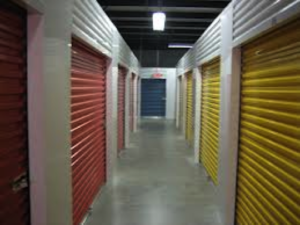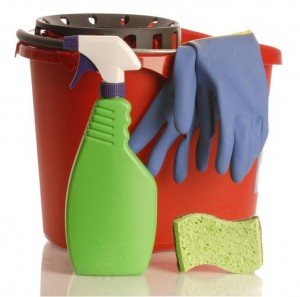 Let’s take a brief trip down memory lane. What was it that initially attracted you to your spouse? Perhaps you fell for his outgoing, life-of-the-party personality. Maybe you were drawn to her gifted, creative nature. In those initial stages of love, you possibly detected his or her organizing limitations but those flaws were a small price to pay to be with the one you loved.
Let’s take a brief trip down memory lane. What was it that initially attracted you to your spouse? Perhaps you fell for his outgoing, life-of-the-party personality. Maybe you were drawn to her gifted, creative nature. In those initial stages of love, you possibly detected his or her organizing limitations but those flaws were a small price to pay to be with the one you loved.
Fast forward a year — or maybe twenty — and you are at your wits end. Why is it so difficult for her to keep the house straight? Why does he leave his stuff everywhere? Your spouse’s disorganization is putting a serious strain on your relationship.
We, who are naturally organized, are mystified by others who struggle in this area. We seldom run late, we rarely lose things, and our homes have always been relatively organized. We take our innate organizing skill for granted. After all, how difficult is it to keep a tidy home, go through the mail, or clear out a closet?
Studies have found the more creative a person, the more organizationally challenged. So, may I be so bold as to suggest that it probably is not just your spouse’s disorganization that is causing a strain in your relationship. Could it possibly be your own willingness to accept that something so simple to you doesn’t come so easy to him or her?
We live in a society that places high value on being organized. A lack of organization costs us both financially and emotionally. Your spouse most likely feels a sense of shame, guilt, and embarrassment for not having their organizing act together. They desire to get organized; they just don’t know how.
Enter the professional organizer. Our purpose as organizers is not just to help you (or your spouse) tidy up, but to transfer and impart those ‘oh so needed’ organizing skills. An effective organizer encourages you to let go of the excess in your home, strategizes with you to plan the best organizing systems for your space, and ensures that you have learned how to maintain a structure and order that works for you both.
So, the next time you feel tempted to nag your spouse over the mess in your home, focus on all those wonderful qualities that drew you together, and consider the value of a professional organizer. We may not be able to solve all your marital woes, but we can surely help when organizing opposites attract.
When your home isn’t peaceful, a place you can retreat to, or a safe haven from the outside world, it will affect you, but how is up to you.
As a professional organizer, I get calls all the time from people expressing thoughts of overwhelm and sharing other complaints such as:
“I can’t live this way anymore”
“I feel stuck”
“I am drowning”
“I don’t know how this happened”
They also tend to express feelings of shame, distress, self doubt, low self esteem, loneliness, and frustration — to name a few! At this point, I reassure them that these feelings aren’t who they are, or who they’ve become. Clutter can’t take away their ‘Greatness’ as a person!
Immediately, I want to assist these people in seeing for themselves that the disorganized mess they have can be fixed with effort and commitment. After listening to their tale, I usually hear some version of “Life wasn’t always this way for me,” or, “My space used to be…” At this point in the conversation, I give a few positive suggestions such as:
It is important to keep in mind that change is a constant, and at times, things become unmanageable temporarily. You can physically clear your clutter and clear the ‘mind chatter’ by having help, support, focus, and intention. One key is to have Patience with yourself. It’s important to take stock of the positives, your accomplishments, and what you are striving to achieve. In doing so, self doubt, shame, loneliness, and low self-esteem can disappear as quick as the clutter, if you are willing to LET IT GO! Remind yourself that life changes and so do you!
Remember this, these thoughts and feelings don’t represent who you are or who you think you have become! The clutter does not define who you are. Each one of us is a perfect, unique energy force.
Please remember your ‘Greatness’!
 When trying to save time and money at the grocery store, the first step is to start with your menu plan. Plan your meals by making a weekly menu. Of course you can also do bi-monthly or monthly if you feel so inspired, but if this is a new process start with a week until you get comfortable with this idea.
When trying to save time and money at the grocery store, the first step is to start with your menu plan. Plan your meals by making a weekly menu. Of course you can also do bi-monthly or monthly if you feel so inspired, but if this is a new process start with a week until you get comfortable with this idea.
For each day of the week, plan what your meals will be including breakfast, lunch, snacks, and beverages. Now check to see if you have written any specialty recipes down that may require additional ingredients such as spices, etc. Start making your grocery list based upon your menu.
Check your pantry and make sure you have all of the ingredients or food items you need to accomplish your meal plan for the week. If you do not, write them down on your grocery list. This way of planning will keep you organized so preparing and cooking your meals will go off without a hitch. Being organized will help to prevent the need to run back to the store for forgotten items or ingredients.
Keep a running grocery list during the week for any supplies that run out or are getting low. Add these items to your grocery list. This is an especially helpful household task for when you have multiple family members. If you used the last of something, put it on the list, do not let the next person needing that item be the one to find out it’s not there when they need it. A detailed grocery list helps you from forgetting items that you may need.
Do you use coupons? If not skip this paragraph. If so, keep your coupons in a file or a convenient place such as your pocketbook. Organize the coupons in the same manner you organized your list; by the order of where those items will be found in the aisles. Check that you are purchasing the exact brand, item, size requirement, etc. from that coupon as you are selecting that item. This will save you time and embarrassment at the checkout counter from choosing an incorrect item. Also check for expiration dates on your coupons.
Now if you want to save time at the grocery store take this list one step further and organize the list based upon the grocery store aisles where you do your shopping. This way you are able to cross items off the list as you go up and down the aisles. This will help you from going back and forth through the aisles if you skip something. It also helps from forgetting items.
To recap:
Planning your menu and grocery list in an organized manner will not only help you become an organized shopper, it will save you time and money as well. Happy Shopping!
“Help! I can’t stand it anymore! My office is a disaster. Papers are piled everywhere. I don’t know where things are. I don’t know what supplies I have until I run out. My bulletin boards have announcements for events that happened two years ago attached to them. I’m behind on my work, and I hate being in my office. My life is a mess!”
“Was this a phone call I received from a potential client?” you may ask. No. This is what I said two weeks ago when I felt like I was drowning in paperwork, and my life was a mess. “But wait,” you exclaim. “You’re a Professional Organizer. You know how to organize stuff. Why can’t you just organize your office?” The answer is that even we, who are experienced and proficient organizing other people’s things, sometimes cannot do it for ourselves.
Every morning I would walk into my office with incredible determination. “This will be the day that I finally and completely organize my office and my life!” But when I walked into my office, something happened. I looked at the piles of paper and the disorganization, and I became paralyzed with dread.
It doesn’t matter whether the area that is disorganized is an office, a kitchen, a bedroom or a play room. Sometimes it just feels as though as much as you really, really want to get organized, you’re just having a hard time doing it. So I asked myself what I would tell a prospective client if they called me with a similar situation.

But what do you do if you can’t get yourself to commit to tackling that cluttered area for even five minutes? Take a tip from a professional who has been-there-done-that. Either call a friend who is nonjudgmental and willing to help or call a professional; which is what I did. I figured that if I call a doctor when I’m sick and go to the dentist when I have a toothache, I should call a professional organizer when it feels like my (insert name of area here) needs organizing. What about you? Take just 5 minutes and call for help. Now? Yes! If not now, when?
 I love the idea that someone can use a storage unit as a business location, a man cave, a wine cellar, or as a place to store their cool sports car.
I love the idea that someone can use a storage unit as a business location, a man cave, a wine cellar, or as a place to store their cool sports car.
I love that a college student can use a storage unit to store their dorm rooms over the summer and that someone can store excess furniture while their house is being marketed for sale.
I love that a builder can use a storage unit to store supplies while they are doing a renovation.
I hate the idea that people are using storage units to store old, dirty appliances, inexpensive furniture, and things that are eventually going to go in the trash, get donated, or get sold.
I hate that people abandon their units with valuable items in storage units and that there are reality TV shows based on this.
During the past couple of weeks, we have worked in storage units, and I am so glad we could help clients get out from under the stuff that was being stored— which had less monetary value than the month’s rent of the unit.
Understandably, people go into storage units for a valid reason initially. In the words of my eloquent husband, “storage units can take on a life of their own.” The items being stored take root in the unit, and the bill is on autopay. This makes it easy to forget or avoid the whole thing.
Many times people no longer know what is in their unit— a hint to me that there is minimal value, emotionally and financially.
Before you make the decision to take on a storage unit, think of the following:
If you answer these questions and can develop a plan, rent the unit.
I hope this advice helps you make a good decision and prevents you from being burdened by a storage unit that takes on a life of its own. If renting a storage unit is the right thing for you, I hope that you have picked up a hint or two to simplify the process.
 I don’t know about you, but spring is my favorite time of year, and the last thing I want to do is spend my weekend or multiple weekends focusing on cleaning and organizing my entire home. Instead of pulling out that long list of spring cleaning duties, consider breaking up the list into bite size pieces to be completed throughout the year.
I don’t know about you, but spring is my favorite time of year, and the last thing I want to do is spend my weekend or multiple weekends focusing on cleaning and organizing my entire home. Instead of pulling out that long list of spring cleaning duties, consider breaking up the list into bite size pieces to be completed throughout the year.
Maintenance is a much easier solution and a tremendous time saver.
Pick Your Battles
Look at your list and determine the cleaning and organizing tasks that make the most sense for this time of year. For example, closets are a great place to start because this is the time of year we change from winter to spring/summer attire. Garages are another good area of focus. Now is the time to put away the snow blower and pull out the lawn mower. And, let’s be honest, things tend to get piled and tossed into the garage all winter, so it’s time for a garage clean-out. Your garden shed is another great fit for seasonal organizing. Inspect and sharpen your garden tools, take stock of your supplies, clean your clay pots and determine your tool storage area based on how often you use the tools. Also, with the onset of warmer weather comes the need to change to lighter blankets and comforters, and once the bed is stripped you can vacuum and turn the mattress to complete the process.
Maintenance is Key
Now that you have decided which areas make sense to organize during the spring season; let’s break the rest of that cleaning and organizing list into manageable tasks to be completed throughout the year. Baseboards, doors, and cobwebs can be dusted and cleaned during the winter when you’re stuck inside during a snowstorm. Lampshades and ceiling fans can be dusted at regular intervals when you dust the rest of your home. Draperies, blinds and carpets can be cleaned in the fall or the end of the summer. Many people have self cleaning ovens that can be cleaned any time of the year, and grease traps and stove filters are easy to replace or clean on an as needed basis.
Consistency is the Name of the Game
Having a consistent, year round routine will help you avoid investing large chunks of time in the spring. Instead, get out and smell the forsythia, spend time with family and friends, or do whatever makes you happier at this wonderful time of year. Organizing and cleaning are necessary for a functional life, so finding ways to spread it out and make it easier in the long run will save you endless hours each season.